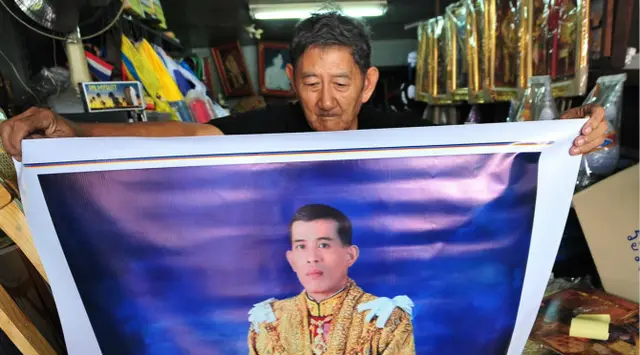By APD writer Chen Jiabao
Thailand has entered the reign of Rama X, with the country's crown prince Maha Vajiralongkorn formally crowned the new king on December 1 after seven decades of reign of his revered late father.
Freshly returned from Germany and surrounded by kneeling officials, the 64-year-old new king took the throne and was named the 10th ruler of the 234-year-old Chakri Dynasty in a televised address by the current junta government leader Prayuth Chan-ocha on Thursday night.
Thailand's new King Maha Vajiralongkorn Bodindradebayavarangkun pays respect to a picture of Thailand's late King Bhumibol Addlyadej and Queen Sirikit, as he accepts an invitation from parliament to succeed his father
“I, hereby, accept the invitation to fulfill the royal wish for the benefits and the happiness of the Thai people,” the new Thai king read in a statement.
The new sovereign ascended the throne after an unprecedented seven-week delay following the death of the late king Bhumibol on October 13. He has refused to immediately assume the monarchy and asked for time to grief for his father's passing.
After royal merit-making ceremony on the 50th day since the late king's death, he finally replaced the only monarch most Thais alive today have known and one who was seen as a symbol of continuity during a reign marked by dozens of changes in prime minister and 10 coups.
The late King Bhumibol (C) passed away on October 13. King Bhumibol was widely seen as a pillar of stability during seven decades of political turmoil in Thailand.
It is widely believed that the delayed succession may improve the new king's standing in Thai's royalists and he doesn't command the same level of respect as his father King Bhumibol.
“The monarchy will not be the same.” Thitinan Pongsudhirak, director of the Institute of Security and International Studies at Chulalongkorn University told Asia Pacific Daily.
“The last king was a hard-worker, he developed bounds with people, he devoted himself to the country, that’s what made him unique and that’s because the circumstance then was unique,” said Thitinan.
The late Thai king was revered by Thais.
Thailand is a constitutional monarchy. Though currently under military rule, King Bhumibol played an important role in stabilizing his country through a time of enormous change which saw neighboring monarchies collapse under the pressures of the Vietnam War.
He was especially known for his energy in development activities, doing hands-on inspections in remote rural areas. He calmed the country through several political crises.
“Political parties, elected politicians, representatives were comparatively weak in the past while the monarchy was strong, so Thailand enjoyed political stability as conflicts can always rely on late king a final arbitrator,” said Thitinan, adding that the late king was uniquely suited for the work that has to be done and he did very well.
The new king rarely speaks in public. He spent much of his time in Germany in recent years.
Thailand's new king rarely speaks in public. He spent much of his time in Germany in recent years. Although he attended the requisite royal ceremonies and in recent years filled in for his father for some ceremonial and diplomatic duties, he is generally a private figure.
The new king faces the challenges of a country that has become fractured over the past decade, as contending political forces engaged in bitter battles that sometimes turned violent, leaving shaking faiths in the democratic system.
It is believed that without the late king's moral authority, the monarchy will not be the same. In other words, the monarchy in the changing times will have to adapt to the development of democracy.
Thitinan predicted that there could be some reforms so that Thailand can always have a monarch and democracy at the same time.
“When you see a weaker king you might see a more assertive role of the military.” says Pavin Chachavalpongpun, a Thai political scientist and columnist of Thai media the Nation.
The official ascension of King Vajiralongkorn will allow the military junta to seek royal consent in order to promulgate the draft constitution, paving the way for the government to prepare for elections late next year, according to Ryan Aherin, senior Asia analyst at Verisk Maplecroft.
The official ascension of King Vajiralongkorn will allow the military junta to seek royal consent in order to promulgate the draft constitution, paving the way for the government to prepare for elections late next year.
Key elements of the new constitution seek to entrench military control. The new charter, which passed a referendum on August 7, contains provisions that will make it extremely difficult for a single party to win a majority in the 500-member lower house.
This will allow the 250 junta-selected senators to play a critical role in parliament, including by choosing a prime minister, who will no longer be required to be an elected member of parliament.
“The military is putting in mechanism to be empowered for some time, certainly, there will be military supervision over Thai politics,” Thitinan said.
Thitinan added that people who know military has to stay for the transitional period as they voted yes to the new constitution which bestowed power upon the military.
Chen Jiabao is the Thailand correspondent for APD news. Major in Thai, she's also a writer on Thai issues with Xinhua News Agency.
 简体中文
简体中文





